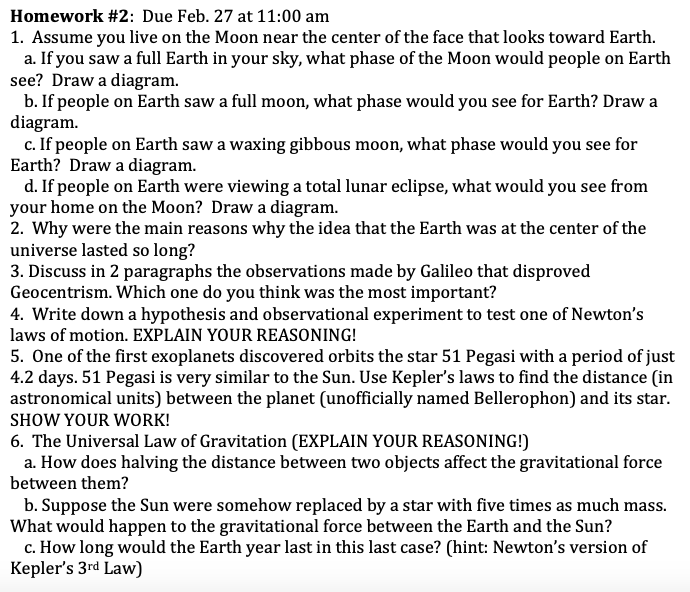Homework #2: Due Feb. 27 at 11:00 am 1. Assume you live on the Moon near the center of the face that looks toward Earth. a. If you saw a full Earth in your sky, what phase of the Moon would people on Earth see? Draw a diagram. b. If people on Earth saw a full moon, what phase would you see for Earth? Draw a diagram. c. If people on Earth saw a waxing gibbous moon, what phase would you see for Earth? Draw a diagram. d. If people on Earth were viewing a total lunar eclipse, what would you see from your home on the Moon? Draw a diagram. 2. Why were the main reasons why the idea that the Earth was at the center of the universe lasted so long? 3. Discuss in 2 paragraphs the observations made by Galileo that disproved Geocentrism. Which one do you think was the most important? 4. Write down a hypothesis and observational experiment to test one of Newton's laws of motion. EXPLAIN YOUR REASONING! 5. One of the first exoplanets discovered orbits the star 51 Pegasi with a period of just 4.2 days. 51 Pegasi is very similar to the Sun. Use Kepler's laws to find the distance (in astronomical units) between the planet (unofficially named Bellerophon) and its star. SHOW YOUR WORK! 6. The Universal Law of Gravitation (EXPLAIN YOUR REASONING!) a. How does halving the distance between two objects affect the gravitational force between them? b. Suppose the Sun were somehow replaced by a star with five times as much mas What would happen to the gravitational force between the Earth and the Sun? c. How long would the Earth year last in this last case? (hint: Newton's version of Kepler's 3rd Law) s.
Assume you live on the Moon near the center of the face that looks toward Earth.
a. If you saw a full Earth in your sky, what phase of the Moon would people on Earth see? Draw a diagram.
b. If people on Earth saw a full moon, what phase would you see for Earth? Draw a diagram.
c. If people on Earth saw a waxing gibbous moon, what phase would you see for Earth? Draw a diagram.
d. If people on Earth were viewing a total lunar eclipse, what would you see from your home on the Moon? Draw a diagram.
Why were the main reasons why the idea that the Earth was at the center of the universe lasted so long?
Discuss in 2 paragraphs the observations made by Galileo that disproved Geocentrism. Which one do you think was the most important?
Write down a hypothesis and observational experiment to test one of Newton’s laws of motion. EXPLAIN YOUR REASONING!
One of the first exoplanets discovered orbits the star 51 Pegasi with a period of just 4.2 days. 51 Pegasi is very similar to the Sun. Use Kepler’s laws to find the distance (in astronomical units) between the planet (unofficially named Bellerophon) and its star. SHOW YOUR WORK!
.The Universal Law of Gravitation (EXPLAIN YOUR REASONING!)
a. How does halving the distance between two objects affect the gravitational force between them?
b. Suppose the Sun were somehow replaced by a star with five times as much mass. What would happen to the gravitational force between the Earth and the Sun?
c. How long would the Earth year last in this last case? (hint: Newton’s version of Kepler’s 3rd Law)

Trending now
This is a popular solution!
Step by step
Solved in 4 steps with 4 images









